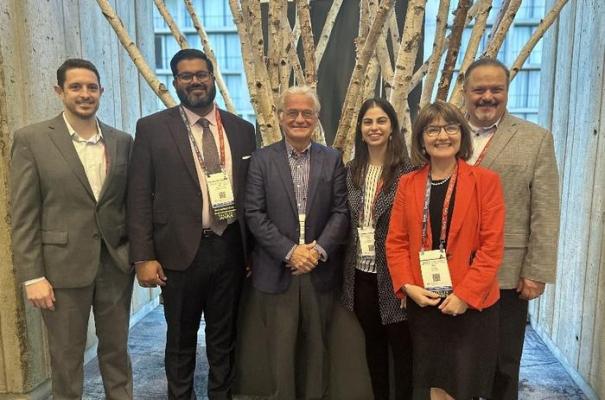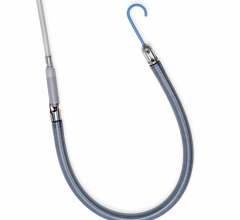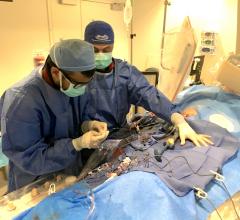
Henry Ford Health's National Cardiogenic Shock Initiative research team. Image courtesy of
Dr. Basir Babar, Henry Ford Health
December 14, 2023 — Published results of a large, national heart attack study show that patients with a life-threatening complication known as cardiogenic shock survived at a significantly higher rate when treated with a protocol developed by cardiologists at Henry Ford Health, in collaboration with 80 hospitals nationwide.
Cardiogenic shock is a critical condition in which the heart is unable to pump enough blood to sustain the body’s needs, depriving vital organs of blood supply. This can cause those organs to eventually stop functioning. The typical survival rate of this deadly complication during a heart attack has historically hovered around 50%.
Led by a cardiology research team based at Henry Ford Hospital in Detroit, the National Cardiogenic Shock Initiative (NCSI) results demonstrate a survival rate of 71% in patients whose heart attack was complicated by cardiogenic shock and were treated with the protocol. Final results from the national study published in the Journal of the American Heart Association were achieved from looking at 406 patients from hospitals across 29 states.
“The National Cardiogenic Shock Initiative is the largest prospective study of therapy for severe heart attack cardiogenic shock done in the United States in the past two decades,” said William O’Neill, M.D., medical director emeritus of Henry Ford’s Center for Structural Heart Disease and principal investigator of the study. “The impressive results from our study in the U.S. have also prompted the use of our protocol in Japan where they are experiencing similar great outcomes.”
The treatment algorithm, available at henryford.com/cardiogenicshock, emphasizes quick recognition of the condition, then inserting a temporary straw-sized pump into the heart to keep blood flowing throughout the body. The Impella® heart pump, an FDA-approved device, is inserted through a catheter in the groin as soon as the patient arrives at the hospital. Doctors then treat the cause of the heart attack, either inserting a stent, removing a clot or taking other necessary action.
The NCSI study involved cardiologists at both community hospitals, where many patients with heart attack first present, and large academic centers. Of the more than 1,100 patients who were screened, 406 were enrolled into the study. The study also isolated predictive markers that indicate a patient’s condition, an invaluable tool in determining treatment.
The NCSI participating hospitals agreed to treat patients who presented with acute myocardial infarction and cardiogenic shock using a standard protocol, which involved rapid initiation of mechanical circulatory support (MCS) with an Impella 2.5 or Impella CP heart pump, along with right heart catheterization to assess status of right and left ventricular heart function. Patients were enrolled between July 2016 and December 2020.
“The study results show remarkable survival, the highest we’ve seen in any study so far,” said Babar Basir, D.O., Director of Acute Mechanical Circulatory Support at Henry Ford Health and principal investigator of the study. “The results show that we now have therapy that can save lives and improve outcomes for people who’ve had severe heart attacks and we haven’t had results like these in 20 years. The protocol has already saved many lives and will continue to do so as more hospitals adopt its principles.”
In the U.S., approximately 80,000 people are diagnosed with cardiogenic shock as a result from a heart attack each year according to data from a published study that looked at a 15-year trend from 2004 to 2018.
Dr. O’Neill will continue to lead research in the next NCSI phase in an upcoming study titled Recover IV Trial.
"Implementing this protocol has truly been a joint effort with hospitals that have experienced the devastating burden of cardiogenic shock,” said Sarah Gorgis, M.D., a cardiologist at Henry Ford Health and co-researcher for the study. “Our work has just begun, but this protocol gives us hope since we have seen first-hand the impact it can make on survival."
“The NCSI initiative was critically important. It changed how we approach the management of patients with cardiogenic shock, and with those changes, we witnessed improvements in survival , for the first time in decades,” said Herb Aronow, M.D., medical director of Heart & Vascular Services at Henry Ford Health.
“Bringing together 80 different sites to investigate an innovative treatment protocol for Acute myocardial infarction complicated by cardiogenic shock is an incredible accomplishment by our NCSI team and heralds highly promising new approaches to improving outcomes in this challenging patient population,” said Henry Kim, M.D., Division Head of Cardiology at Henry Ford Health.
For more information: henryford.com/cardiogenicshock


 April 27, 2023
April 27, 2023 

